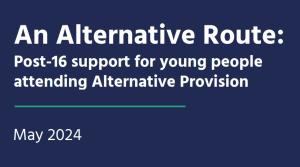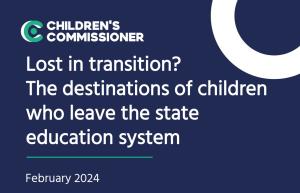Foreword by Dame Rachel de Souza DBE, Children’s Commissioner for England
As Children’s Commissioner for England, my mission is to help make England the best place to grow up in the world. This means the ambitions of every child being matched by the support around them – by their family, schools and, where needed, being able to access brilliant mental health, social care and Special Educational and Disabilities (SEND) support. It also means wherever you live, whichever school you attend, you should get the very best possible education and support – we should have no patience for “good enough”.
This has got to start with all children attending school, or other high quality education, regularly, every day, unless there is a good and established reason not to. While the majority of children are attending every day, there are tens of thousands of children who are persistently or severely absent or missing from education altogether. I made it my mission to establish where these children are instead and understand the reasons for them not attending – illness, disengagement or where additional support is needed. And then find out how we can remove the barriers to getting them back into school. This is why I’m pleased to publish the interim findings from my Attendance Audit, ahead of my final report in the spring.
This work is especially important as we emerge from the pandemic. Children missed school. The absence of school from the routines of so many has confirmed what I already knew – schools, and the people who work in them, are vital. They are the place where children learn, where they make friends, where they find things they are passionate about and talented at. A place that is safe, with adults around them who care about their lives and that provides routine, structure, and discipline. I want to pay testament to everyone working with children for all of their hard work and commitment in improving children’s lives and outcomes. I have spoken to many children about the impact of the lockdowns on their education and it is important that we celebrate the achievement of schools returning to something like normality this term. But there are some children who haven’t come back after the lockdowns, and not just because of having to isolate due to Covid.
Even before the pandemic there were a group of children who were falling through the gaps in education – those awaiting a school place, those being educated at home because their needs weren’t being met at school, and those who had simply fallen off the radar.
In The Big Ask, our survey of children in England, we heard from nearly 5,000 children who said they were home educated and nearly 2,000 children who were not in school at all. Of course, some families choose to home educate for philosophical reasons and have the resources and ability to do so. But many children spoke of the challenges they had faced in school, such as bullying, struggling with anxiety and other mental health needs, or having special educational needs which weren’t being identified or supported. These children were out of school, not because of choice, but because they hadn’t received the support they need.
In order to investigate how much Local Authorities (LAs) know about children that are missing education, my office has surveyed all LAs and the results are striking. Before this work there was no national picture of where children are and if they are attending schools. From the survey we have conducted we have found that LAs do not have an accurate figure of how many children there are in England – let alone the number of children not receiving education. Many LAs rely on time lagged population estimates to tell them how many children there are in their area, but migration and other factors mean this information is often inaccurate.
This is an urgent problem. It is crucial that we know where all children are, and that we develop the necessary infrastructure to maintain this understanding. We need to recognise the barriers to attendance that individual children face so we can build a system that will enable them to thrive.
The picture is complex. Even where LAs were able to provide an estimate of children missing from education (for example children who have dropped out of school), there are hundreds of children that have never interacted with the education system that we know nothing about. The ‘known unknowns’, includes children who have never been on a school roll, perhaps because they have gone missing from care or who have been trafficked into the country. It is essential that we change this worrying reality. There should be no ‘unknown’ children to the system. Policy makers, schools and LAs must be able to identify and reach these children. The results also show that complexities in data sharing and system design have led to a postcode lottery in the identification of children and the level of support in each area.
This is despite great work from many LAs to overcome the systemic barriers they face in identifying children, such as weekly meetings with safeguarding partners and schools, to provide wrap around care and additional support to children who are not in school. But these sorts of interventions are where individual leaders are going above and beyond for children despite the limitations of the system. It is often luck rather than design. And I want to eliminate that lottery from children’s experiences.
Alongside this national survey, my team and I are talking to children, frontline professionals and system leaders across the country to really understand the story behind these statistics. The next stage of the work is a deep dive in 10 LAs. I want to understand children’s barriers to attendance, to identify what gets in the way of safeguarding these children effectively, and to explore what they need to get back to school. I can only do that by getting out there and speaking to children and the adults that care for them.
Ultimately, these findings shed light on a very concerning situation: we cannot identify where each child is. There are thousands of children who support services do not have contact with, and authorities are therefore unable to ensure their safety, wellbeing and learning. This is an urgent problem that requires immediate, collaborative and practical solutions to improve our systems and give children the care and education that they deserve. It is not, however, insurmountable. There are places that are doing this well, so it can be done. We can solve this, together.





